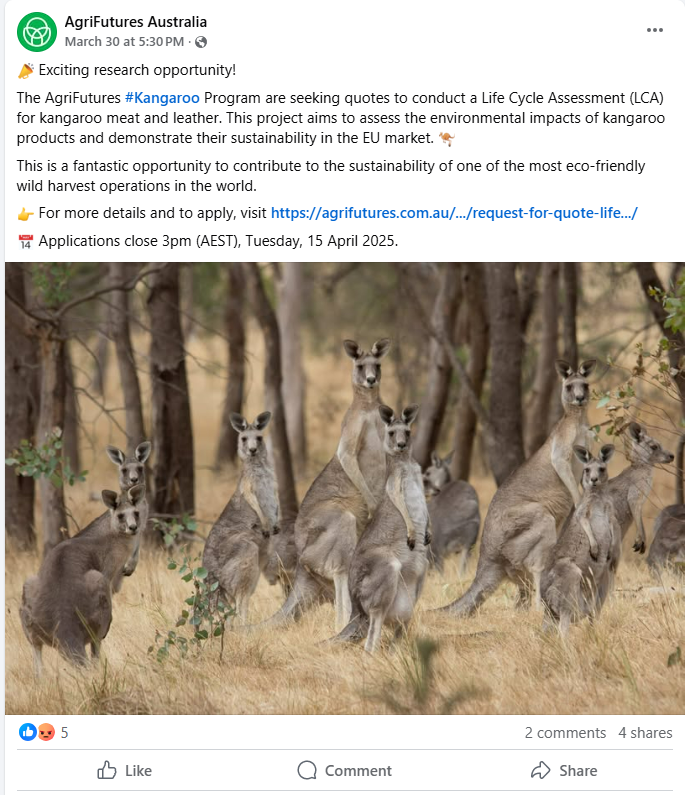The Facebook post by AgriFutures Australia seeks quotes from a researcher for a specified project – “This project aims to assess the environmental impacts of kangaroo products and demonstrate their sustainability in the EU market. ![]() This is a fantastic opportunity to contribute to the sustainability of one of the most eco-friendly wild harvest operations in the world.“
This is a fantastic opportunity to contribute to the sustainability of one of the most eco-friendly wild harvest operations in the world.“

THE OUTCOME OF THE RESEARCH IS STATED BEFORE THE RESEARCHER IS EVEN HIRED
Science should be a beacon of truth, a tool to cut through bias and bullshit. But too often, it’s a hired gun, dressed up in white coats to peddle an industry’s lies. The AgriFutures Kangaroo Program’s Life Cycle Assessment (LCA) of kangaroo products, launched in March 2025, is a textbook case of this disgraceful game. Billed as a quest to “assess environmental impacts” and “demonstrate sustainability,” it’s less a study and more a script—one where the conclusion was penned before the ink hit the page. As a kangaroo advocate who’s exposed this racket in my book The Kangaroo Con, I’m here to call it what it is: a sham dressed up as science.
The kangaroo industry has been spinning its eco-friendly fairy tale for years. They crow about low-methane kangaroos hopping across pristine plains, sparing the planet the sins of cattle farming. They paint harvesting as a noble act—culling for the greater good, saving ecosystems from overgrazing. It’s a slick pitch, one they’ve flogged to death in export markets like the EU, where greenwashing can turn a profit. AgriFutures, a cozy bedfellow of this industry, now wants an LCA to “prove” it. Their RFQ demands a cradle-to-grave analysis of kangaroo meat and leather, complete with ISO standards and comparisons to beef. Sounds legit—until you see the strings attached.
Dig into the details, and the fix is in. The project’s cheerleading starts early, nodding to kangaroos’ “potential environmental benefits” like it’s a foregone conclusion. Their social media hype—calling it “one of the most eco-friendly wild harvest operations in the world”—practically hands the researchers a script: make us look good. Worse, they’re leaning on industry insiders—harvesters and processors—for primary data. That’s like asking a fox to guard the henhouse and report back on how safe the chickens feel. This isn’t science seeking truth; it’s a PR stunt with a bibliography.
In The Kangaroo Con, I’ve laid bare the industry’s dirty secrets: unsustainable quotas, shaky population counts, and ecological fallout swept under the rug. The wild harvest they tout as a green miracle is a house of cards—overharvesting disrupts ecosystems, not saves them. Yet here’s AgriFutures, betting on an LCA to slap a shiny “sustainable” label on a rotting carcass. They’re not after discovery; they’re after ammunition. If the data doesn’t fit, you can bet it’ll be massaged—or buried—until it does.
This isn’t a kangaroo-scandal—it’s an industry playbook. Big Tobacco cooked studies to downplay cancer risks; Big Oil funds “research” to muddy climate science. The kangaroo racket’s just the latest to buy a lab coat and call it credibility. They’re banking on the public’s trust in science to sell a lie, and it’s a betrayal that stinks worse than a slaughterhouse floor. Even if the LCA’s ISO standards force some rigor, the deck’s stacked—favorable metrics will be cherry-picked, inconvenient truths sidelined. The EU market, hungry for eco-credentials, won’t care about the fine print as long as the headline glows green.
Could this study backfire? Sure, a real LCA might expose the industry’s underbelly—high export emissions, habitat strain, or the sheer brutality of mass culls. But don’t hold your breath. When science starts with a paycheck and a preferred outcome, it’s not truth-seeking—it’s truth-shaping. The kangaroo industry’s sustainability myth isn’t up for debate here; it’s up for coronation. As I’ve argued in The Kangaroo Con, the numbers don’t lie—but the people spinning them do.
So, next time you hear about this “groundbreaking” LCA, don’t buy the hype. It’s not science—it’s a sales pitch with a fancy logo. The kangaroos deserve better than to be props in this con, and we deserve science that doesn’t bow to the highest bidder. This isn’t just a study; it’s a warning: when industry calls the shots, truth’s the first casualty.

